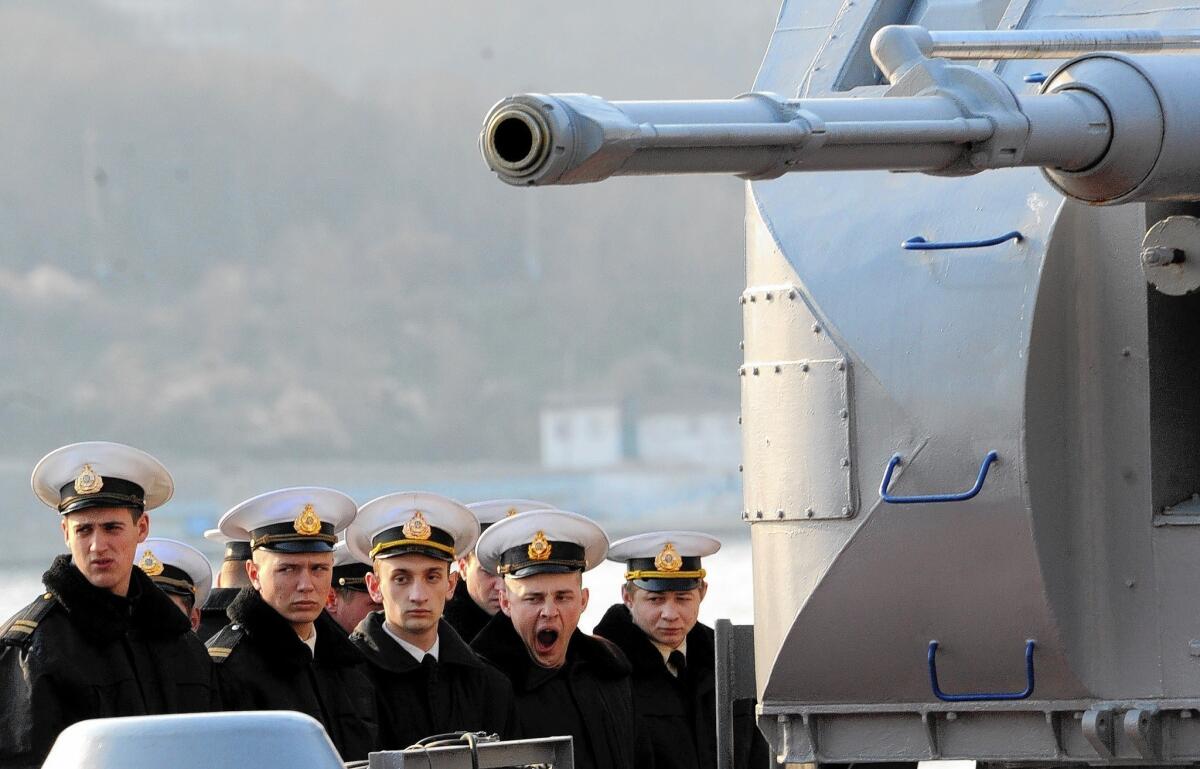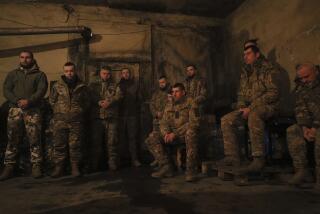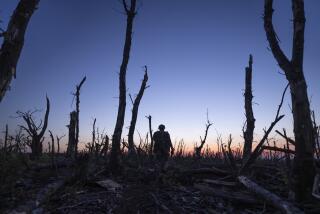Ukraine watches nervously as world powers wrestle over its future

KIEV, Ukraine — For all its moral outrage and vows never to be partitioned, this country has become almost a bystander to the struggle over its future.
With Russian forces looming over a disputed vote on secession in Crimea, it’s increasingly clear that what happens to Ukraine will be decided not here in its capital, Kiev, but in Moscow, Washington and Brussels, the real power brokers in Europe’s worst geopolitical crisis this century.
By itself, Ukraine lacks the political, economic and military clout to take on its giant neighbor to the east. Its new government is fragile, its people depend on Russian gas to stay warm, and its troops are vastly outnumbered and outgunned.
Ukraine’s only recourse has been to appeal for outside help and to broaden the stakes by emphasizing its national crisis as an international one. As a consequence, what President Obama and other leaders have tried to avoid framing as a revival of the Cold War is quickly turning into a facsimile of just that: a face-off between Russia and the West, and their competing visions for Europe.
A diplomatic solution to Moscow’s military incursion in Crimea seems elusive, with Russian President Vladimir Putin ignoring demands from the United States and the Brussels-based European Union to withdraw troops from the strategically important peninsula and cancel Sunday’s referendum.
Moscow has also shunned demands for direct dialogue with the new Ukrainian leadership, which it regards as a cabal brought to power by the illegitimate overthrow of President Viktor Yanukovich, a Russia ally. Instead, the Kremlin has hinted that it might join a “contact group” including Washington and Brussels but excluding Kiev, which would further sideline Ukraine’s interim leaders.
“The United States is the only country in the world that can persuade Putin to have direct talks with the Ukrainian government,” said Taras Berezovets, a Kiev-based analyst. “Otherwise, our fate will be decided behind our backs.”
In many ways, the unfolding drama revisits the days when Kiev’s wishes were almost incidental. In 1954, Soviet leader Nikita Khrushchev summarily transferred Crimea from Russia to Ukraine (the shift was a nominal one, as both republics belonged to the Soviet Union). Sixty years later, Putin appears determined to reabsorb the region, under the guise of protecting its Russian-speaking majority.
Moscow’s proxies now wield nearly all the levers of power in Crimea. They’ve wrested control of the regional assembly, which called Sunday’s referendum on whether to split from Ukraine and join Russia. They also appear to be commandeering the media, reportedly disrupting Ukrainian-language broadcasts in cities such as Sevastopol and Simferopol, the regional capital, and kidnapping and harassing pro-Kiev activists and journalists.
Russian soldiers and local militias have seized most Ukrainian military installations, including airfields and ammunition depots. Ukrainian troops have offered little to no resistance, a restraint that has robbed Russian forces of a reason to open fire and thwarted those “trying to drive toward some kind of military confrontation,” said Geoffrey R. Pyatt, the U.S. ambassador to Kiev.
But Ukraine’s order to its troops in Crimea to stand down and, in effect, become onlookers reflects necessity as much as virtue. Ukraine has no nuclear weapons — it voluntarily disarmed in the mid-1990s, in exchange for guarantees from Russia, the U.S. and Britain to respect Ukraine’s territorial and political integrity.
Ukraine’s conventional forces pale in strength beside Russia’s, which by Ukrainian estimates include 80,000 troops massed along the border, a day or two’s march from Kiev. The government plans to introduce a bill in parliament this week to create a 20,000-member National Guard to supplement Ukraine’s 41,000 troops.
“In military terms, Ukraine cannot allow itself to have war against Russia,” Berezovets said. “It’s trying to avoid any military conflict with Russia, even at the price of losing Crimea.”
That has left Kiev little choice but to seek international assistance to head off Sunday’s plebiscite, which the U.S. and the EU insist will not be considered valid.
“There is no other way [we] have to protest,” acting Foreign Minister Andriy Deshchytsia said.
Interim Prime Minister Arseny Yatsenyuk has launched a diplomatic offensive this week in the U.S., meeting Obama at the White House on Wednesday and delivering an address to the United Nations Security Council on Thursday.
Yatsenyuk has been eager to expand the political dimensions of the standoff beyond his country’s borders, and to remind the West of pledges made in the 1994 Budapest Memorandum that led to its nuclear disarmament.
“This is not just Ukrainian-Russian crisis,” he said last week. “This is the crisis in Europe.”
The West has responded to his appeal. In a move recalling the Cold War, the North Atlantic Treaty Organization dispatched reconnaissance planes to Central and Eastern Europe this week to monitor the situation in Ukraine.
Yatsenyuk has led this country of 46 million people for less than three weeks, since protesters toppled the former president, Yanukovich, in anger over corruption and his decision to align with Russia rather than the European Union. Although Yatsenyuk, who is just 39, enjoys the support of the demonstrators who remain encamped in Kiev’s Independence Square, his fledgling government is still weak and could get shuffled after an emergency presidential election in May.
Ukraine’s decrepit economy further handicaps its dealings with Russia, which supplies most of its natural gas. Government coffers are close to empty.
The only actors capable of exerting real economic pressure on Moscow are the U.S. and the European Union. Having ruled out military intervention, Washington and Brussels plan to squeeze Russian officials and possibly the oligarchs who support Putin. On Tuesday, American and European representatives gathered in London to draft a list of targets of travel bans and asset freezes if Putin does not “de-escalate” the crisis.
Harsher economic penalties are supposed to follow if the situation worsens. Shutting Russian banks out of the international financial system, one possibility under discussion, could have a significant impact on the Russian economy, analysts say.
But without the threat of armed action, Western leverage remains limited. The Crimean crisis is a far cry from the events of 1991, after Iraqi strongman Saddam Hussein invaded neighboring Kuwait, which prompted a U.S.-led war to oust him. Not least of the differences this time is a potential adversary “that is armed to the teeth and that has nuclear weapons,” as Yatsenyuk put it in an address to the Ukrainian parliament Tuesday.
All of which leaves Ukrainians to watch nervously as the world’s great powers plot their next moves.
Deshchytsia, the foreign minister, described the mood as grim.
“We have to admit that our life now is almost like … a war,” he said this week. “We have to cope with an aggression that we do not understand.”
derstand.”
More to Read
Start your day right
Sign up for Essential California for news, features and recommendations from the L.A. Times and beyond in your inbox six days a week.
You may occasionally receive promotional content from the Los Angeles Times.







